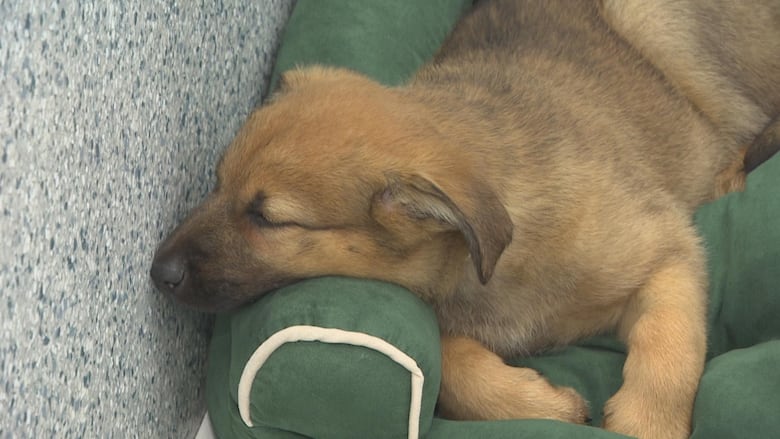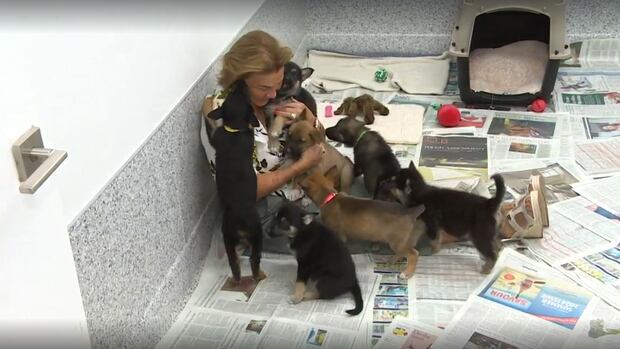As shelters fill up from animal seizures, advocates call on Manitoba to crack down on illegal breeding
Winnipeg Humane Society running over capacity after taking hundreds of seized animals on its care

Animal shelters and advocacy groups are calling on the province to crack down on illegal pet breeding after a string of animal seizures pushed the Winnipeg Humane Society into an occupancy crisis.
Last week, Manitoba's veterinarian and animal welfare office removed 137 dogs while searching a home north of Winnipeg. The dogs, many of whom were in distress, were taken into protective custody by the Winnipeg Humane Society.
Jessica Miller, CEO of the Winnipeg Humane Society, couldn't confirm if the dogs were rescued from an illegal breeder or puppy mill, and said the province is still investigating what led to last week's seizure. But after the 137 dogs were rescued, she said legislative changes are needed to fully investigate and end backyard breeding operations.
"There is a North American-wide sheltering crisis; there is absolutely zero need for people to be creating these animals," Miller said in an interview Wednesday.
Last week's seizure came on the heels of four other seizures. In May the City of Winnipeg's Animal Services Agency took 68 Maltese dogs from a home in the city, bringing them into the humane society's care.
WATCH | Winnipeg Humane Society 'bursting' with animals in care after 137 dogs seized from home:
More than 100 animals pulled from three other seizures were also taken to the shelter. Miller said animals were rescued in three groups, one with 70, another one with 40 and one with 15 animals.
"We cannot continue this way. It's completely unsustainable," Miller said. "We are seeing large seizures, way more than we can handle."
Legislation without enforcement
Under Manitoba's Animal Care Act, a person needs a provincial licence to operate a breeding premise for companion animals, such as dogs.
Miller said the province has not allocated funding to enforce its companion animal breeders licensing program since 2012, leaving Manitoba's Chief Veterinary Office without the resources to investigate cases of illegal breeding and penalize those who infringe the act by operating without a licence.
"I'm done with it. We're done with it. It's time to legislate it right out of Manitoba," she said.

The province quietly suspended the licensing requirement for dog breeders more than a decade ago. CBC News learned the decision was made not long after Manitoba's Animal Care Act was amended in 2012, requiring more licensing and regular inspections from animal breeders.
A spokesperson for the province said Manitoba "rigorously enforces" the Animal Care Act, which mandates owners uphold "specific standards of care" to ensure the well-being of their animals.
The province said compliance with the legislation is enforced through regular inspections and investigations that might lead to orders, prosecution, or the seizure of animals if the act is infringed.
Canada's 'best system' unimplemented: advocate
"Manitoba theoretically, on paper, has the best system in the country, yet has never implemented it," said Camille Labchuk, lawyer and executive director of Animal Justice.
The province has a regulatory and licensing regime within its legislation with provisions overseeing backyard breeding. But Labchuk said documents obtained by the animal advocacy group through a freedom of information request show the province didn't properly fund what was required for the animal welfare authorities to conduct inspections and manage or issue breeding licenses.
She said the province has not allocated the resources to enforce the Animal Care Act.
"Manitoba could choose tomorrow to start enforcing those laws and that would require that people interested in breeding dogs get licensed," she said.
"We strongly believe that this new government, which has enunciated its commitment to animal welfare, has the moral authority and obligation to step forward and fully implement this regime."
But even if that was the case, Labchuk said the province's existing legislation is vague and lacks specific and high standards for animal welfare, which often leads to more non-enforcement.

Winnipeg Pet Rescue Shelter founder Carla Martinelli Irvine agrees.
"We do need tougher laws," she said. "In the last six months, it's just become absolutely terrible with the amount of animals."
The animal shelter runs over capacity, taking care of only rescued pets. Irvine said backyard breeding in rural parts of the province is putting a strain on Winnipeg's shelter system.
After hundreds of dogs were seized and taken under care by the Winnipeg Humane Society, the shelter froze its intake, and calls to admit pets at Irvine's rescue shelter started going overboard. But they soon had to start turning pets away as well.
"It is just heartbreaking when you know animals are out there suffering, and there's not much you can do about it … you don't have the space," she said.
Mirroring Winnipeg's approach
Irvine said the province should follow other jurisdictions, starting with a breeding licensing and enforcement program like the one set by the City of Winnipeg.
City council passed a new set of animal control and welfare bylaws in 2022, including a new animal breeding permit, which can only be obtained after following a list of requirements. Residents must show a history of responsible pet ownership, and the city must inspect the property intended for breeding for a sanitary check.
Complaints of illegal breeding are also followed by an investigation, with animal service officers issuing tickets to those breaching the city's by-law.
"In a perfect world, we would have provincial legislation that mirrors the city legislation that cracks down on breeders," Miller said.
"We're supposed to be here to open our arms and facility to animals that need us," she said. "And it's becoming harder and harder with mass seizures when we could just break down some of these barriers and legislate it right out of the picture."
With files from Mike Arsenault



